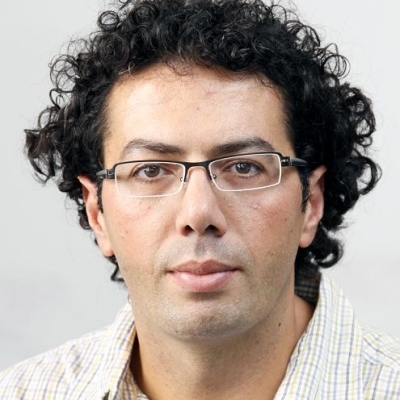



 Ramzy Baroud
Ramzy BaroudJenin: remember this name. Every time you lose faith in humanity, recall it. Repeat it inside yourself, slowly, when you are feeling down and frail; it should lift your spirit. It is a memory of courage, courage despite these times of despair and degradation, courage that is legendary, almost mythical. How else can we explain the fact that a small refugee-camp, less than a kilometre square on the ground, has stood for many days in the face of hundreds of tanks, Apache helicopters and thousands of trained killers (‘soldiers’)?
Established in 1953 as a makeshift tent-city to house thousands of Palestinian refugees, this small camp breeds tenacity and defiance. Many of the Palestinians who were uprooted from their villages in Palestine to live in its humiliating conditions were still able to see the land that had been theirs, simply by looking west. So for nearly five decades they looked west. Now their children are also taught to look west. Westward of Jenin is Palestine, their home, about which they have learnt from their grandmothers: stories and histories about their families and forebears, and of how wonderful and normal life once was.
Thirteen thousand refugees lived in Jenin camp, near the city of Jenin in the West Bank. Their dreams were of more than paved roads, functional sewage systems and good schools. Their dream was of returning home. Many still held the deeds to their lands in Palestine; some even held the large old keys of their stolen homes, and most knew what UN Resolution 194 meant: it meant international recognition of their right to return. But for decades those refugees remained without homes and without rights; for decades they were subjected to endless cruelty. In 1967 Israel invaded the West Bank and Ghazzah, and the refugees were under military occupation as well.
In recent years the young people of the camps have grown to 44 percent of the total number of Palestinian refugees. Despite few means many managed to get an education at nearby universities: Bir Zeit, Bethlehem and Najah. A young, educated yet defiant generation was born and raised in the small camp: a generation that never forgot to look westward, a generation that was never afraid to take up and carry on their parents’ hopes. That ageing, dying generation taught them more than one valuable lesson: never forget Palestine, our rights, our pride or our dignity. And they never have; insha’Allah they never will.
When Palestinians exploded in anger Jenin refugee-camp was in the forefront, leading the crowds, chanting the loudest, demanding justice and all Palestinians’ right to return to Palestine. Israel knew too well what Jenin meant. That particular refugee-camp was a major obstacle to Israel’s attempts to suppress the Palestinians and break their spirit.
In March Israel carried out “Operation Colorful Journey” against Jenin and Balata refugee-camps. The ‘Operation’ was colorful and bloody: about 20 Palestinians were killed and hundreds wounded in the camps. Many homes were destroyed, but the people’s spirit remained strong. Israeli officials said that their mission in Jenin was like “picking up terrorists with tweezers.” But even the tweezers of the fourth strongest army in the world, one of the ‘most powerful’ nuclear powers, was barely enough to bend Jenin’s will. Jenin fought hard; as the soldiers pulled out, Palestinians emerged from their homes singing about Palestine and freedom and bringing their dead to be buried.
But Sharon never forgets his unfinished battles. Revenge is his excuse, even against human beings fighting mostly with old rifles and kitchen knives. As he deployed his forces to invade West Bank towns recently, he sent nearly 300 tanks, thousands of soldiers and many helicopter-gunships to invade Jenin camp. Shaul Mofaz, head of the Israeli military, led the ‘operation’ while the world stood by and the Palestinians fought alone. At the time of writing, after eight days of intensive bombing and horrendous killings, the camp is yet to fall. Hundreds of homes have been destroyed, mass graves have been opened, scores of dead have been buried in haste, people have been trapped under the rubble of their homes, but the camp is yet to fall. Frustrated by the resistance of the small camp, Israeli tanks began to roll over everything, homes and mosques alike, to open a new battlefront against the defiant refugees, but the camp has still not fallen.
Hundreds of people are thought to be buried under the rubble; many bodies were scattered in the streets; Israel began a systematic bombardment of the entire camp, the wounded bled to death without medical attention, just brokenhearted mothers screaming in vain. Still the camp not only resisted but fought back against an army that once claimed to be invincible.
From inside the camp, using a cellphone with a dying battery, a Palestinian fighter reached al-Jazeera satellite-television. “I just wanted to tell the proud people of the world not to worry, we are resisting and will fight to the last drop of blood.” In the background a proud people listened to the speaker, maybe thinking that the world really heard or cared. They all chanted for freedom and Palestine before the battery died, perhaps never to be recharged.
By the time this article is published perhaps Jenin camp will be bulldozed, probably hundreds more will be dead, and the fighting may still be going on. But under no circumstances will the remaining Palestinian refugees of Jenin be coerced into abandoning their fight for freedom or their vow to return. Israel has still not realised that, despite its using the most sophisticated US-manufactured weapons, the people of Jenin camp will never abandon their fight, nor ever cease to look west, to where their land and homes are, where Palestine is calling its true people to come home.
